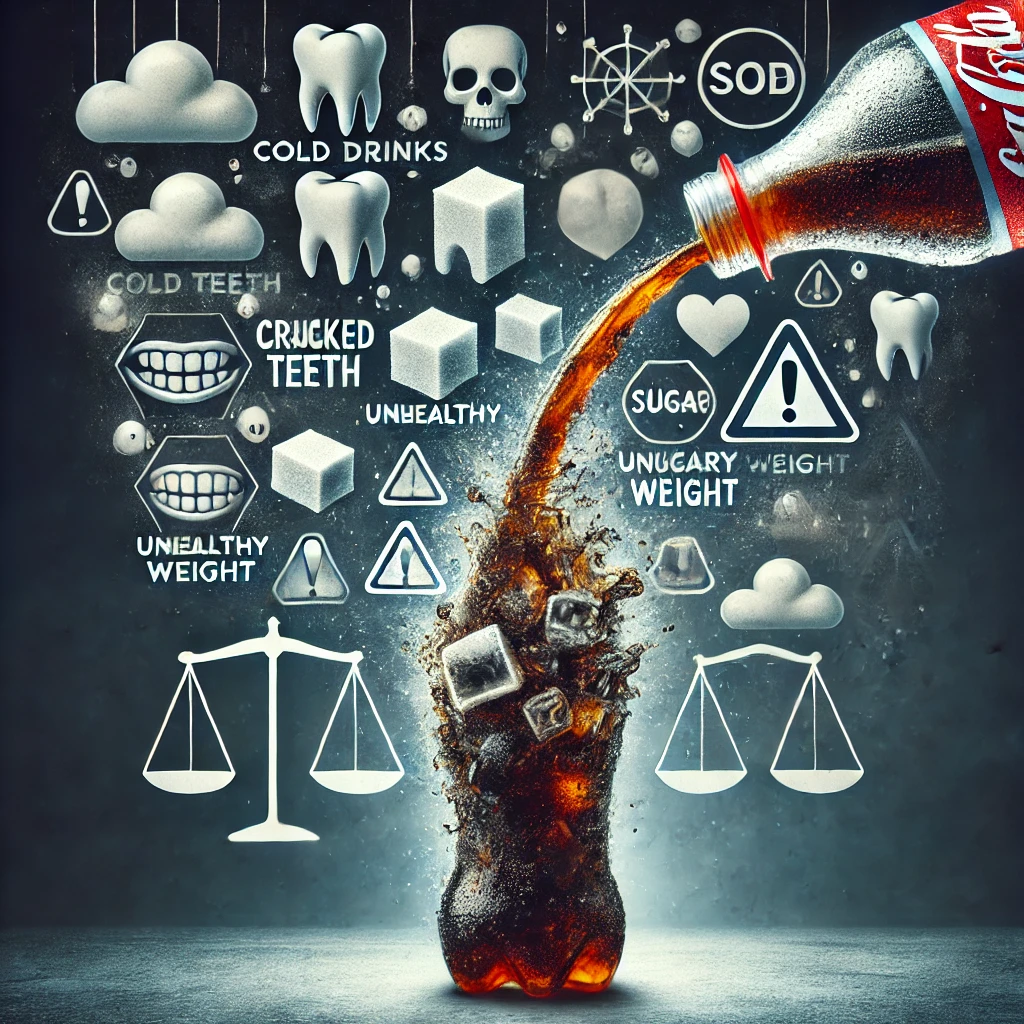Harmful Effects of Drinking Cold Drinks
Cold drinks, particularly carbonated soft drinks and sugary beverages, are widely consumed around the world. While they may provide a temporary sense of refreshment, especially in hot weather, they can have several harmful effects on health when consumed regularly or in large quantities. The adverse effects can be attributed to high sugar content, artificial ingredients, carbonation, and acidity. Below is a detailed overview of the harmful effects of drinking cold drinks:
1. High Sugar Content and Associated Health Risks
Cold drinks are often loaded with high levels of added sugars. Consuming excess sugar can lead to various health issues, including:
- Obesity: Sugary drinks are calorie-dense with little to no nutritional value. The high sugar content contributes to weight gain and obesity, as these drinks do not make you feel full, leading to overconsumption of calories.
- Type 2 Diabetes: Regular consumption of sugar-sweetened beverages can cause insulin resistance, leading to increased blood glucose levels and, eventually, Type 2 diabetes.
- Heart Disease: Excessive sugar intake is linked to increased risk factors for heart disease, such as high blood pressure, elevated cholesterol levels, and inflammation in the arteries.
- Liver Damage: High fructose corn syrup, a common sweetener in many cold drinks, is metabolized by the liver. Overconsumption can result in fatty liver disease, which may progress to more severe liver conditions over time.
2. Risk of Tooth Decay and Dental Erosion
Cold drinks, especially sodas, are highly acidic due to ingredients like phosphoric acid and citric acid. The combination of high acidity and sugar content can lead to:
- Enamel Erosion: The acidity in cold drinks can erode tooth enamel, the protective outer layer of teeth, making them more susceptible to decay.
- Cavities: Sugary cold drinks feed bacteria in the mouth, producing acid that contributes to the formation of cavities and tooth decay.
- Dry Mouth: The high sugar content and carbonation in these drinks can reduce saliva production, which is essential for neutralizing acids and protecting teeth from damage.
3. Impaired Digestive Health
Cold drinks can interfere with the digestive system in several ways:
- Bloating and Gas: The carbonation in cold drinks releases carbon dioxide in the digestive tract, which can lead to bloating, gas, and discomfort.
- Acid Reflux: The high acidity of sodas and other carbonated beverages can relax the lower esophageal sphincter, allowing stomach acid to flow back into the esophagus, leading to acid reflux or heartburn.
- Gastrointestinal Distress: Cold drinks can irritate the stomach lining and worsen symptoms of gastritis or ulcers, causing pain and discomfort.
4. Dehydration
While cold drinks may feel refreshing, many of them contain caffeine and sugar, which can lead to dehydration:
- Diuretic Effect: Caffeine, commonly found in colas and energy drinks, acts as a diuretic, increasing urine production and potentially leading to dehydration if consumed in excess.
- Increased Thirst: Paradoxically, sugary cold drinks can increase feelings of thirst due to their high sugar concentration, which causes the body to pull water from cells to dilute the sugar in the bloodstream.
5. Bone Health Complications
The phosphoric acid in cold drinks, particularly sodas, has been associated with decreased calcium absorption, leading to potential bone health issues such as:
- Osteoporosis: Long-term consumption of cold drinks, especially colas, has been linked to reduced bone mineral density, increasing the risk of osteoporosis and fractures, especially in women.
- Calcium Depletion: The high phosphorus content can lead to an imbalance in the calcium-phosphorus ratio, which may result in calcium being leached from bones, weakening them over time.
6. Artificial Additives and Health Risks
Many cold drinks contain artificial sweeteners, preservatives, and colorings that can have negative effects on health:
- Artificial Sweeteners: Diet sodas contain artificial sweeteners like aspartame or saccharin, which have been linked to metabolic issues, altered gut microbiota, and an increased risk of diabetes and weight gain.
- Food Dyes and Preservatives: Chemical additives used for coloring and preserving cold drinks may trigger allergic reactions, hyperactivity in children, and potentially increase the risk of cancer when consumed in large quantities.
7. Weight Gain and Metabolic Syndrome
Consuming cold drinks regularly can lead to weight gain, particularly around the abdomen. This visceral fat is linked to:
- Metabolic Syndrome: A cluster of conditions that include increased blood pressure, high blood sugar, excess body fat around the waist, and abnormal cholesterol levels, all of which increase the risk of heart disease, stroke, and diabetes.
8. Kidney Damage
The high sugar and artificial ingredient content in cold drinks can negatively affect kidney function:
- Kidney Stones: The high phosphoric acid and sugar content in cold drinks can contribute to the formation of kidney stones.
- Kidney Disease: Regular consumption of sugary cold drinks has been associated with a higher risk of developing chronic kidney disease, particularly when coupled with other risk factors like diabetes and hypertension.
9. Impact on Mental Health
The sugar rush from cold drinks may provide temporary energy, but it can also have long-term negative effects on mental health:
- Mood Swings: The rapid rise and fall in blood sugar levels after consuming sugary cold drinks can lead to mood swings, irritability, and fatigue.
- Depression and Anxiety: Studies have shown that regular consumption of sugary drinks is associated with an increased risk of depression, anxiety, and other mental health disorders.
Conclusion
While cold drinks may be appealing due to their refreshing taste, they can have numerous harmful effects on the body when consumed excessively. From increasing the risk of chronic diseases like obesity, diabetes, and heart disease to damaging teeth, bones, and kidneys, cold drinks pose a significant health risk. To mitigate these effects, it is recommended to limit or avoid the consumption of sugary and carbonated beverages, replacing them with healthier alternatives like water, herbal teas, or natural fruit juices.



Hey! Do you know if they make any plugins to help with SEO?
I’m trying to get my site to rank for some targeted
keywords but I’m not seeing very good results. If you know of
any please share. Cheers! I saw similar art here: Eco wool
Yes The name of Pugin Code Snippets it will help you to rank your website.